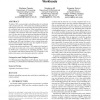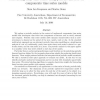75 search results - page 13 / 15 » Observer dependent deformations in illustration |
ATAL
2007
Springer
14 years 1 months ago
2007
Springer
A robot’s ability to assist humans in a variety of tasks, e.g. in search and rescue or in a household, heavily depends on the robot’s reliable recognition of the objects in th...
SIGMETRICS
2010
ACM
13 years 11 months ago
2010
ACM
We define CWS, a non-preemptive scheduling policy for workloads with correlated job sizes. CWS tackles the scheduling problem by inferring the expected sizes of upcoming jobs bas...
FORTE
2008
13 years 9 months ago
2008
The paper studies a distributed implementation method for the BIP (Behavior, Interaction, Priority) component framework for modeling heterogeneous systems. BIP offers two powerful ...
CSDA
2006
13 years 7 months ago
2006
We explore a periodic analysis in the context of unobserved components time series models that decompose time series into components of interest such as trend, seasonal and irregu...
INFOCOM
2009
IEEE
14 years 2 months ago
2009
IEEE
Distributed opportunistic scheduling (DOS) is studied for wireless ad-hoc networks in which many links contend for the channel using random access before data transmissions. Simpl...


